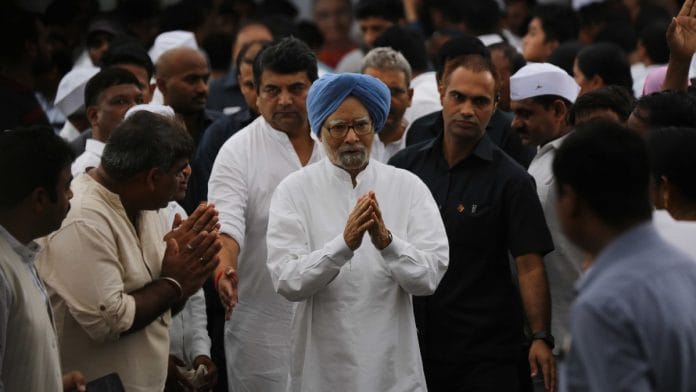Thank you dear subscribers, we are overwhelmed with your response.
Your Turn is a unique section from ThePrint featuring points of view from its subscribers. If you are a subscriber, have a point of view, please send it to us. If not, do subscribe here: https://theprint.in/subscribe/
Humankind has a peculiar habit: we are quick to criticize when someone is alive and equally quick to shower accolades when they are no more. This paradox is stark in the case of Dr. Manmohan Singh, whose passing on December 26, 2024, at the age of 92, marks the end of an era in Indian politics. A figure of immense intellect and quiet resolve, Singh’s life encapsulates the contradictions of leadership—praised as a visionary economist and criticized for presiding over a regime tarnished by corruption.
The Architect of India’s Economic Reforms
Born into a poor family in Gah, British India (now in Pakistan), Dr. Singh rose to prominence through sheer brilliance and perseverance. With degrees from Cambridge and Oxford, he established himself as an eminent economist.
As Finance Minister in the Narasimha Rao government (1991–1996), Singh was the architect of India’s economic liberalization. At a time when the nation was on the brink of financial collapse, his reforms opened India to global markets, dismantled decades of stifling socialist controls, and laid the foundation for the country’s emergence as a global economic power. His landmark budget speech of 1991 remains a pivotal moment in India’s history, a turning point that transformed the economic landscape and lifted millions out of poverty.
A Reluctant Prime Minister
When Dr. Singh became India’s first Sikh Prime Minister in 2004, he was seen as a symbol of integrity and intellect. His first term was marked by significant achievements, including high economic growth and the U.S.-India Civil Nuclear Agreement, which ended India’s nuclear isolation.
However, his second term (2009–2014) saw his government embroiled in some of the most infamous corruption scandals in post-independence India. The 2G spectrum allocation, coal block allocations, and Commonwealth Games scams not only resulted in massive financial losses but also eroded public trust in governance. Critics lamented his perceived helplessness in curbing the wrongdoing, attributing it to the constraints of coalition politics and the overarching influence of the Congress Party’s leadership.
As I wrote in my book Walking the Indian Labyrinth in 2007: “If the Indian Prime Minister knows nothing about these scandals, he is ignorant of ground realities and does not deserve to be Prime Minister. If he does, is he a collaborator in crime?” This sentiment captures the dilemma of Dr. Singh’s leadership—whether his inaction was born of ignorance or a calculated compromise remains a question that continues to haunt his legacy.
A Mixed Legacy
Despite the controversies, Dr. Singh’s contributions to India’s growth and development are undeniable. Under his leadership, India saw unprecedented GDP growth and an expansion of its middle class. Yet, his tenure also highlighted the limitations of a technocrat in a politically charged environment.
Dr. Singh was a paradox—a man of impeccable personal integrity who presided over a government mired in corruption. A visionary economist whose political legacy remains contentious.
A Human Paradox
As tributes pour in following his death, it is worth reflecting on the inconsistency with which we treat individuals. In life, Dr. Singh was often mocked for his perceived silence and passivity; in death, he is being hailed as a statesman and a visionary. This dichotomy is a reminder of how we often fail to value individuals during their lifetimes, only to romanticize their contributions in their absence.
Dr. Manmohan Singh’s life and career challenge us to move beyond this paradox. Let us strive to recognize and appreciate people’s worth while they are still with us, rather than waiting for their absence to articulate our admiration.
Advocate Mohan Murti, Former Managing Director- Europe, Reliance Industries Limited, based in Germany
These pieces are being published as they have been received – they have not been edited/fact-checked by ThePrint


